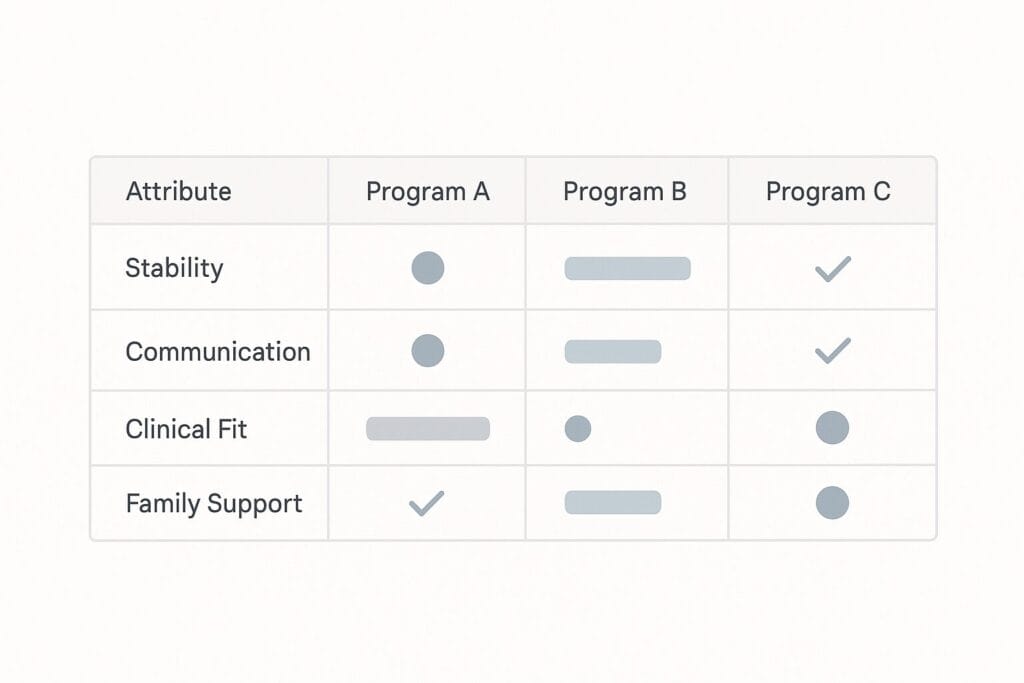Educational consultants don’t choose programs based on marketing, modalities, or how polished your website looks. They choose based on credibility, consistency, and whether your program makes their job easier or harder.
Consultants protect their reputation every time they refer a family. If a placement goes badly, it hurts them—not just you. That’s why consultants filter programs using a higher standard than parents and a completely different decision process.
Consultants Don’t “Recommend Programs”—They Protect Families
Good consultants aren’t matchmakers. They’re risk managers. Their primary questions are:
- “Is this program stable?”
- “Will this family be safe and supported?”
- “Does this team communicate consistently?”
- “Will I get blindsided by something they should have told me?”
Consultants choose programs that minimize risk—for the family and for themselves.
This is why shiny marketing never moves the needle with consultants. They want predictable operations, not polished language.

What Educational Consultants Look For First
After talking with hundreds of consultants over the years, the same evaluation patterns repeat across the industry. They almost always start with:
1. Program Stability
Consultants watch for:
- leadership turnover
- staff continuity
- consistent clinical direction
- clear policies and procedures
- predictable operations
A program that seems volatile—even slightly—gets dropped from their rotation.
2. Communication Quality
Consultants want:
- timely replies
- clear updates
- proactive communication
- honesty about challenges or incidents
Programs that go quiet or communicate defensively lose referrals fast.
3. Fit and Scope of Care
Consultants assess whether your program is truly built for the youth they’re trying to place—not who you’d like to accept.
- population served
- clinical strengths
- structure and supervision level
- program culture
Misrepresenting your fit destroys consultant trust permanently.
4. Transparency
Consultants expect straightforward answers to difficult questions:
- safety incidents
- critical events
- state audits
- licensing status
- discipline processes
Programs that hide information or sugarcoat issues lose credibility instantly.
5. Predictable Family Experience
Consultants want to know:
- what the family will experience on day one
- how communication flows during treatment
- what happens when challenges arise
- how crises are managed
Programs that cannot describe their process clearly rarely get consistent referrals.
What Consultants Care About More Than Anything Else
More than clinical model. More than marketing. More than your activity list.
Consultants care about:
- Safety
- Stability
- Communication
- Predictability
- Honesty
If a consultant risks their reputation by referring to you, they must believe you won’t make them regret it.
Why Consultants Stop Referring (The Red Flags)
Every consultant has dropped a program over:
- surprise incidents the program didn’t disclose
- defensive communication
- inconsistent leadership
- vague clinical direction
- frequent family complaints
- frustrating enrollment experiences
They rarely announce they’re leaving. They simply stop referring.
How to Become a Program Consultants Actually Trust
1. Be easier to work with than other programs
Clear updates. Fast replies. Calm communication. Predictable systems.
2. Give them clarity they can explain to families
Consultants must translate your program to parents. Make that translation simple.
3. Communicate issues before they hear about them
Nothing destroys consultant trust like learning bad news from a parent.
4. Make the admissions experience smooth
A consultant’s reputation rises or falls on how their referred families feel during enrollment.
Consultants Don’t Need “More Information”—They Need Reliability
Consultants already know the industry. They’ve toured hundreds of programs. They can spot weak leadership, unclear messaging, and operational cracks instantly.
What they’re looking for is the program that stays consistent when things get hard.
Request a Consultant Readiness Audit
Or read next: How Tribal Nations Select Youth Treatment Providers.













